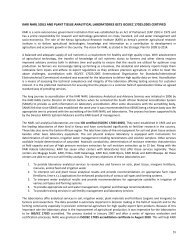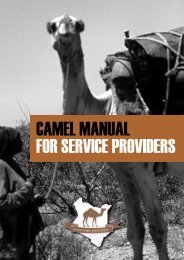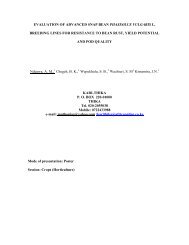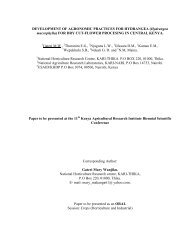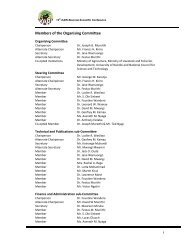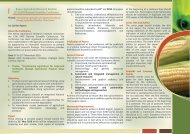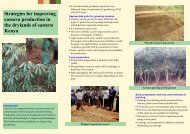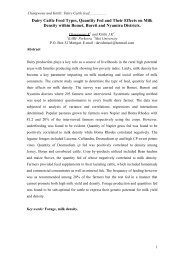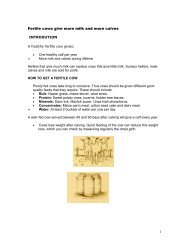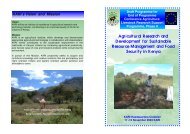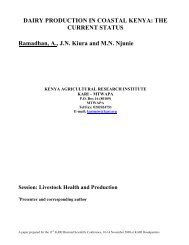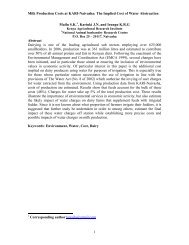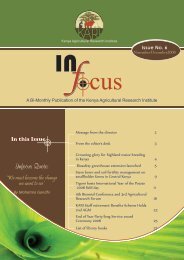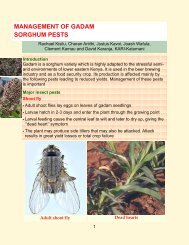January - June 2008 - Kenya Agricultural Research Institute
January - June 2008 - Kenya Agricultural Research Institute
January - June 2008 - Kenya Agricultural Research Institute
Create successful ePaper yourself
Turn your PDF publications into a flip-book with our unique Google optimized e-Paper software.
National Genebank of <strong>Kenya</strong> Hosts National Stakeholders’ Workshop<br />
on Plant Genetic Resources for Food and Agriculture (PGRFA)<br />
By P.W. Wambugu and Z.K. Muthamia, National Genebank of <strong>Kenya</strong><br />
Farming throughout the world is underpinned by<br />
the vast genetic diversity of agricultural<br />
plants. This diversity, if well managed and conserved,<br />
has long been viewed as an important vehicle towards<br />
achieving food security. These resources are also a core<br />
to livelihoods and every effort should be made to<br />
sustainably use and conserve them. This therefore calls<br />
not only for well planned conservation and management<br />
strategies but also for well formulated policies. In an effort<br />
to achieve this objective, FAO commissioned several<br />
studies dealing with PGRFA in the country. In order to<br />
share results and experiences from the various projects,<br />
the National Genebank of <strong>Kenya</strong> hosted a national<br />
stakeholders’ workshop held in Nakuru from 11 th – 14 th<br />
<strong>June</strong> <strong>2008</strong>.<br />
The workshop was officially opened by Agriculture<br />
Secretary, Dr. W. Songa on behalf of the Permanent<br />
Secretary, Ministry of Agriculture. While noting the<br />
importance of PGRFA, he underscored the need for plant<br />
genetic resources to be properly conserved and shared.<br />
He noted that PGRFA provide the biological basis for food<br />
security and supports the livelihoods of the nation’s<br />
population. At the same time, he noted that PGR serve as<br />
the plant breeders most important raw materials and the<br />
farmers most essential input into agriculture. While<br />
recognizing and appreciating the efforts played by KARI<br />
in conserving germplasm, he regretted that the country<br />
had lost important germplasm.<br />
The Agriculture Secretary recognised the importance<br />
of the workshop as its discussions and deliberations are<br />
important in fighting poverty and hunger. He informed<br />
the participants that in order to fight hunger and<br />
economically empower the populace, the government had<br />
put in place several strategies. Currently, Dr. Songa noted<br />
that the Strategy for Revitalizing Agriculture (2004 – 2014)<br />
was the most important as it feeds into Vision 2030 which<br />
The Agriculture Secretary, Dr. W. Songa (left) chats with<br />
some of the workshop participants<br />
has 3 pillars: Economic, social and governance. He<br />
observed that in spite of the importance played by PGR in<br />
the process of agricultural production, insufficient and<br />
poor documentation of data on the same has hampered<br />
optimal conservation, access and use.<br />
The workshop agenda revolved around 5 key issues<br />
namely:<br />
• Access to Seeds in Rural Livelihoods<br />
• Strategic assessment on the state of PGRFA in <strong>Kenya</strong><br />
• Role of markets in promoting sustainable utilization<br />
of plant genetic resources<br />
• National Information Sharing Mechanism on PGRFA<br />
• Mainstreaming gender consideration into National<br />
Seed Programmes and Policies in <strong>Kenya</strong><br />
The workshop drew attendance of a total of 40<br />
participants representing about 25 stakeholder institutes<br />
among them public universities, national and international<br />
research institutes, ministry of agriculture, extension<br />
service providers and NGOs.<br />
The workshop noted that over 90% of the seed of<br />
especially traditional, neglected and under utilised.<br />
crops is sourced from the informal seed sector. Ironically,<br />
while the informal seed sector is the greatest source of<br />
seeds, farmers in some regions considered the quality of<br />
these seeds as FAIR while those from the formal sector as<br />
GOOD. Other gaps identified as being a hindrance to<br />
small scale farmers accessing seeds include limited<br />
collection and conservation of traditional/indigenous<br />
crops and plant species which play important role in food<br />
security and nutrition in rural areas, weak linkages<br />
between conservation and utilization of PGR and lack of<br />
capacity by current generation of rural poor small scale<br />
farmers to characterise, conserve, evaluate and<br />
sustainably use PGR to increase food security and<br />
agricultural production. Additionally, despite women<br />
playing a key role in the informal seed sector, their<br />
involvement in national seed policy and programs is very<br />
limited. Seed regulations do not also support the<br />
development of informal seed sector in areas of<br />
production, processing, maintenance, exchange and<br />
marketing.<br />
During its deliberations, the workshop identified some<br />
policy issues that need to be addressed key among them:<br />
• Establishing a national biodiversity centre to<br />
coordinate PGR activities in the country<br />
• Promoting traditional/ under utilised/ emerging crops<br />
• Streamline access and benefit sharing of PGR through<br />
a multi-institution/discipline effort<br />
• Policy highlighting possibility of giving incentives to<br />
farmers in order to conserve PGR.<br />
• Implement seed relief policy<br />
• Amendment of Seed and Plant Variety Act CAP 326<br />
• Implementing amended seed regulations<br />
• Strengthening KARI Seed Unit and other public<br />
institutions to produce basic seed for orphan crops<br />
• Need to initiate and encourage some type of quality<br />
standards in the informal seed sector.<br />
Highlighter No. 23<br />
13



